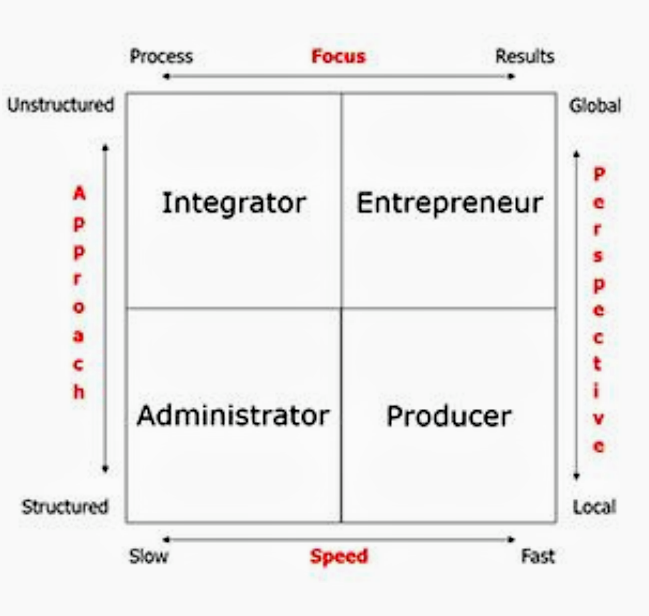This content borrows from the great work of Ichak Adizes and his research into corporate lifecycles and management.
Entrepreneurship and the continuum of change
From my work and research, the continuum of change acceptance and change resistance is constant. Generally, for a business to be successful and last, there are four roles or behaviors that are needed (sometimes/often(?) 1 person holds many roles)
Just four essential functions can define the fundamental management roles for any team, department, or company. If an organization can develop these four roles, it will be successful. Therefore, understanding and developing these functions in an organization is essential knowledge for management.
- Producer gets work done and ensures quality and timeliness are consistent.
- Administrator keeps things legal and retains policies, and that budget can keep the business safe.
- Entrepreneur drives innovation and growth.
- Integrator brings together various people, processes, products, systems, etc., into a coherent whole.
Produce, Administer, Entrepreneur, Integrate
Role #1 – Produce:
The first and foremost role of an organization is to produce results. The result to be produced — the fundamental reason for the organization’s existence — is to satisfy customer needs. This role focuses on producing the product or service offerings to the marketplace.
Role #2 – Administer:
While the Producing role focuses on what to do, the Administering role focuses on how to do things. Administering focuses on the activities and functions that get things organized, planned, scheduled, systematized, and generally under control by capturing the learning curve about how to do things right in processes, procedures, and systems.
Role #3 – Entrepreneur:
Entrepreneuring drives the organization to adapt to change successfully. It focuses and pulls a company to create new opportunities and respond to threats. The Entrepreneur requires that organizations have “sight” and the ability to see things that others cannot see, plus the willingness to believe in those visions and undertake significant risks.
Role #4 – Integrate:
For organizations to succeed over a long period, they need to establish a “life” that is independent of the life their founder(s) provided. The Integrating role focuses on developing a cohesive team that makes the organization efficient over the long term. Well-integrated organizations have a pervasive and persistent culture of mutual trust and respect.
The challenge is making way for them all to dance and flow together.
The change-resistant areas (producer & administrator) like structure and thrive with it—the change-accepting areas (Entrepreneur & integrator) like openness and an unstructured approach.
Below is a 2×2 matrix that illustrates the idea further.


